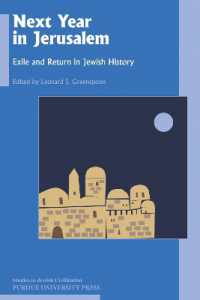- ホーム
- > 洋書
- > 英文書
- > Religion / Ethics
Full Description
As government by the people, democracy has always had its proponents as well as opponents. What forms of government have Jewish leaders, both with and without actual political power, favored? Not surprisingly, many options have been offered theoretically and in practice. Perhaps more surprisingly, democracy has been at the heart of most systems of governance. Biblical Israel was largely a monarchy, but many writers of the Bible were critical of the excesses that almost always arise when human kings take charge: the general populace loses its freedom. In rabbinic Judaism, the majority ruled, and many principles that support modern democratic institutions have their basis in interpretations offered by the classical rabbis. This is true even though rabbinic Jews did not govern democratically. When Jews did have some degree of self-governance, democratic principles and institutions were often upheld. At the same time, so most communal leaders insisted, God—the ultimate judge—ultimately judges everything and everyone. Modern Israel provides the first instance of an independent Jewish nation since the Hasmonean monarchy of the second and first centuries BCE. On an almost daily basis, common features uniting democracy and Judaism, as well as flash point of controversy, are highlighted there. The fourteen scholars whose work is collected here are mindful of all of these circumstances—and many more. In a style that is accessible, clear, and balanced, they allow readers to assess these issues based on the most current thinking. This volume is required reading for anyone interested in how religion and politics have interacted, and continue to interact, in Judaism and among Jews.
Contents
Acknowledgments
Editor's Introduction
Contributors
Goalkeeping: A Biblical Alternative to Greek Political Philosophy and the Limits of Liberal Democracy, by Joshua I. Weinstein
The "Will of the People" in Antimonarchic Biblical Texts, by Baruch Alster
The Democratic Principle Underlying Jewish Law: Moving Beyond Whether It Is So to How and Why It Is So, by David Brodsky
Mipnei Darkhei Shalom: The Promotion of Harmonious Relationships in the Mishnah's Social Order, by Simcha Fishbane
Theocracy as Monarchy and Anarchy, by Samuel Hayim Brody
Jewish Democracy: From Medieval Community to Modern State, by Joseph Isaac Lifshitz
Linking "Egypt with Texas": Emma Lazarus's Jewish Vision of American Democracy, by David J. Peterson and Joan Latchaw
Judaism and Democracy , by Lenn E. Goodman
Monarchy and Polity: Systems of Government in Jewish Tradition, by Lawrence H. Schiffman
Democracy, Judaism, Israel, Art, and Demagoguery, by Ori Z. Soltes
Dignity and Democracy: Defending the Principle of the Sanctity of Human Life, by Alan Mittleman
"The Will of the People" or "The Will of the Rabbis": Democracy and the Rabbis' Authority, by Shlomo Abramovich
The Jewish State and the End of Democratic Judaism, by Meirav Jones








